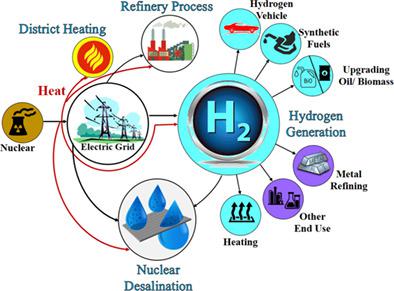当前位置:
X-MOL 学术
›
Int. J. Energy Res.
›
论文详情
Our official English website, www.x-mol.net, welcomes your
feedback! (Note: you will need to create a separate account there.)
An overview of sustainable energy development by using cogeneration technology and opportunity for improving process
International Journal of Energy Research ( IF 4.3 ) Pub Date : 2020-09-14 , DOI: 10.1002/er.5742 Ali Akbar Salehi 1 , Mohammad Ghannadi‐Maragheh 2 , Meisam Torab‐Mostaedi 2 , Rezvan Torkaman 2 , Mehdi Asadollahzadeh 2
International Journal of Energy Research ( IF 4.3 ) Pub Date : 2020-09-14 , DOI: 10.1002/er.5742 Ali Akbar Salehi 1 , Mohammad Ghannadi‐Maragheh 2 , Meisam Torab‐Mostaedi 2 , Rezvan Torkaman 2 , Mehdi Asadollahzadeh 2
Affiliation

|
Nowadays, energy supply is one of the most prominent demands of countries in the world. The enhancement in energy efficiency, flexibility for applications in various industrial processes, and the reduction in the environmental impacts of pollutant emissions can be accomplished by using sustainable energy sources. Alternative procedures for heat and electricity production have been developed in the commercial and industrial sectors and focusing on the cogeneration systems, and the contribution of nuclear energy has been increased for improving processes. Nuclear reactors play an essential role in nonelectric applications, and combined heat and energy at different operating temperatures can be provided by a variety of nuclear reactors such as small modular reactors. The working temperature is a critical factor in the cogeneration process. The light-water reactors and small modular reactors (SMRs) (280-325°C) are suitable for desalination and district heating. In comparison, high-temperature gas-cooled reactor (HTGR) reactors (750-950°C) are ideal for hydrogen production. Feasibility studies are essential for improving the performance of a nuclear power plant to recover heat loss. In this review, the cogeneration technology is described based on nuclear energy with its application in various processes such as water desalination, hydrogen production, chemical processes, etc. In addition, investigation of novel techniques, existing design, environmental impacts, and economic issues have been illustrated in this review.
中文翻译:

使用热电联产技术的可持续能源发展概述和改进过程的机会
当今,能源供应是世界各国最突出的需求之一。通过使用可持续能源,可以提高能源效率、在各种工业过程中应用的灵活性以及减少污染物排放对环境的影响。商业和工业部门开发了热电生产的替代程序,重点是热电联产系统,并增加了核能对改进工艺的贡献。核反应堆在非电力应用中发挥着重要作用,不同工作温度下的热能组合可由各种核反应堆(例如小型模块化反应堆)提供。工作温度是热电联产过程中的关键因素。轻水反应堆和小型模块化反应堆 (SMR) (280-325°C) 适用于海水淡化和区域供热。相比之下,高温气冷堆 (HTGR) 反应器 (750-950°C) 是制氢的理想选择。可行性研究对于提高核电厂的性能以回收热损失至关重要。在这篇综述中,以核能为基础描述了热电联产技术及其在海水淡化、制氢、化学过程等各种过程中的应用。此外,对新技术、现有设计、环境影响和经济问题的研究在这篇评论中得到了说明。高温气冷堆 (HTGR) 反应器 (750-950°C) 是制氢的理想选择。可行性研究对于提高核电厂的性能以回收热损失至关重要。在这篇综述中,以核能为基础描述了热电联产技术及其在海水淡化、制氢、化学过程等各种过程中的应用。此外,对新技术、现有设计、环境影响和经济问题的研究在这篇评论中得到了说明。高温气冷堆 (HTGR) 反应器 (750-950°C) 是制氢的理想选择。可行性研究对于提高核电厂的性能以回收热损失至关重要。在这篇综述中,以核能为基础描述了热电联产技术及其在海水淡化、制氢、化学过程等各种过程中的应用。此外,对新技术、现有设计、环境影响和经济问题的研究在这篇评论中得到了说明。
更新日期:2020-09-14
中文翻译:

使用热电联产技术的可持续能源发展概述和改进过程的机会
当今,能源供应是世界各国最突出的需求之一。通过使用可持续能源,可以提高能源效率、在各种工业过程中应用的灵活性以及减少污染物排放对环境的影响。商业和工业部门开发了热电生产的替代程序,重点是热电联产系统,并增加了核能对改进工艺的贡献。核反应堆在非电力应用中发挥着重要作用,不同工作温度下的热能组合可由各种核反应堆(例如小型模块化反应堆)提供。工作温度是热电联产过程中的关键因素。轻水反应堆和小型模块化反应堆 (SMR) (280-325°C) 适用于海水淡化和区域供热。相比之下,高温气冷堆 (HTGR) 反应器 (750-950°C) 是制氢的理想选择。可行性研究对于提高核电厂的性能以回收热损失至关重要。在这篇综述中,以核能为基础描述了热电联产技术及其在海水淡化、制氢、化学过程等各种过程中的应用。此外,对新技术、现有设计、环境影响和经济问题的研究在这篇评论中得到了说明。高温气冷堆 (HTGR) 反应器 (750-950°C) 是制氢的理想选择。可行性研究对于提高核电厂的性能以回收热损失至关重要。在这篇综述中,以核能为基础描述了热电联产技术及其在海水淡化、制氢、化学过程等各种过程中的应用。此外,对新技术、现有设计、环境影响和经济问题的研究在这篇评论中得到了说明。高温气冷堆 (HTGR) 反应器 (750-950°C) 是制氢的理想选择。可行性研究对于提高核电厂的性能以回收热损失至关重要。在这篇综述中,以核能为基础描述了热电联产技术及其在海水淡化、制氢、化学过程等各种过程中的应用。此外,对新技术、现有设计、环境影响和经济问题的研究在这篇评论中得到了说明。











































 京公网安备 11010802027423号
京公网安备 11010802027423号